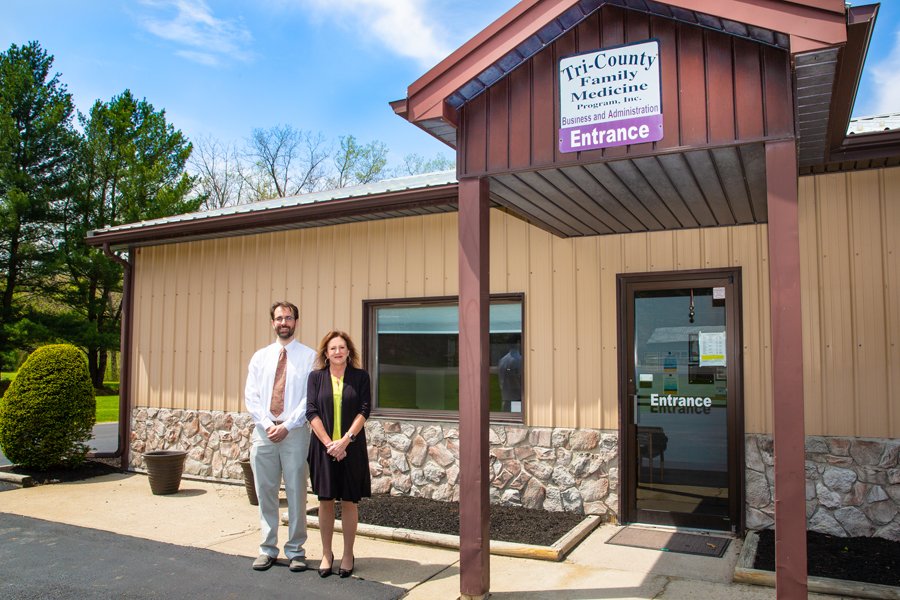
Tri-County Family Medicine achieved improvements and exemplary recognition from the New York State Department of Health.
By Robin L. Flanigan
Diabetic patients at Tri-County Family Medicine Program, Inc. used to be given a lab slip at three-month routine appointments to have their hemoglobin A1C levels checked—an indicator of blood sugar control over time.
Fast forward three months to the next follow-up appointment. There often was no lab result in the patient’s medical record.
Provider: “Did you get your blood work done?”
Patient: “Oh, no, I forgot. I’ll do it next time.”
Even if patients kept their word, by that point six months would pass without necessary information to manage their diabetes. As a result, almost a quarter of Tri-County’s patients—22%— were failing to get their hyperglycemia, or high blood sugar, under control at the end of 2017, making them vulnerable to cardiovascular problems, kidney disease, stroke and other serious consequences.
As part of its recent work with Common Ground Health, the practice took a hard look at those numbers and developed new procedures that, while seemingly simple, improved patients’ experiences and led to better results for Tri-County as a whole. One change involves patients getting diabetic checks done during appointments—instead of having blood drawn later at a lab.
The result was a 5 percentage point decline in patients with uncontrolled diabetes.

“The impact for cost and health outcomes for that many more people is huge,” explains Kiera Kuhn, Tri-County’s director of quality, performance improvement and corporate compliance.
Onsite testing is just one of many recent improvements that earned the practice “exemplary” status from the New York State Department of Health—and an invitation to present at the National CMS Quality Conference in January, 2019. Providers, patients and payers who attended the conference from around the county heard about clinical and performance milestones that have made the practice more effective, efficient, accessible and cost-effective.
Kuhn credits the technical assistance from Common Ground for helping the practice reach their goals.
“They were the go-to-people,” she says. “We’d discuss something, then they’d research best practices and get back to us with the expertise and concrete data we needed.”
Tri-County, which operates five community health centers across rural, poverty-pocked Livingston and Steuben counties, has a long history of public leadership. In fact, more than 80% of its board members are patients, allowing the practice to easily identify with, and represent, the needs of the communities it serves.
“I could see loud and clear when I started working with them that they’re dedicated to understanding the population they work with,” says Deborah Osterberg, quality improvement clinical advisor on Common Ground’s practice transformation team. “They had a culture of collaborative education and training, and they’ve continued to go diligently on this road to produce more clinically relevant work—all guided by their cultural North Star.”
From 2013 to 2016, through a Center for Medicare & Medicaid Innovation Practice Transformation Network grant, Tri-County worked with a part-time clinical advisor and practice improvement advisor to embed care managers alongside providers, nurses and staff, allowing them to participate in huddles as well as help with transitions of care and chronic care management.
Tri-County works closely with hospitals, for example, to get real-time alerts when patients have been seen in the emergency department, placed in observation, or admitted as an inpatient. Patients are then scheduled for a post-hospital visit, and a process begins to create the most accurate medication list possible to avoid errors.
“A smooth handoff is very hard to accomplish between care teams and between institutions, and we’re doing a really good job,” says Tri-County CEO Nicholas Apostoleris. “This transition of care initiative has benefits for our patients, but also for hospitals and CMS. When the ball drops, every one of these systems gets impacted negatively.”
The practice also hired a quality/data manager to measure and monitor efforts and outcomes.
“It’s all about precision documentation today,” notes Kuhn. “It used to be that if it wasn’t documented, it wasn’t done. Now, if it’s not documented in the right place [in the electronic medical record], it’s not done. That can be a challenge.”
It’s a challenge being met on several fronts.
Over the past two years, with a Transforming Clinical Practice Initiative grant through the New York State Practice Transformation Network, Tri-County improved access, team performance and clinical outcomes.
One goal was for more patients to successfully manage chronic disease. In addition to diabetes, the practice worked with patients on high blood pressure.
Between 2016 and 2018, the rate of patients whose hypertension was under control rose from 74% to 78%.
Aside from moving the needle on key clinical measures, Tri-County has excelled at something else not always common in the medical field—maintaining a high retention rate among providers.
“There’s a lack of either overt or covert dissatisfaction or disagreement about values when you work together with shared expectations,” says Apostoleris, who recently joined Common Ground Health’s Board. “A lot of times clinicians these days are being commodified—and if you don’t build an environment where people feel this is their work home, that this is where their profession lies, they’re going to start acting like commodities.
“If we don’t get that human part of it, we lose.”

